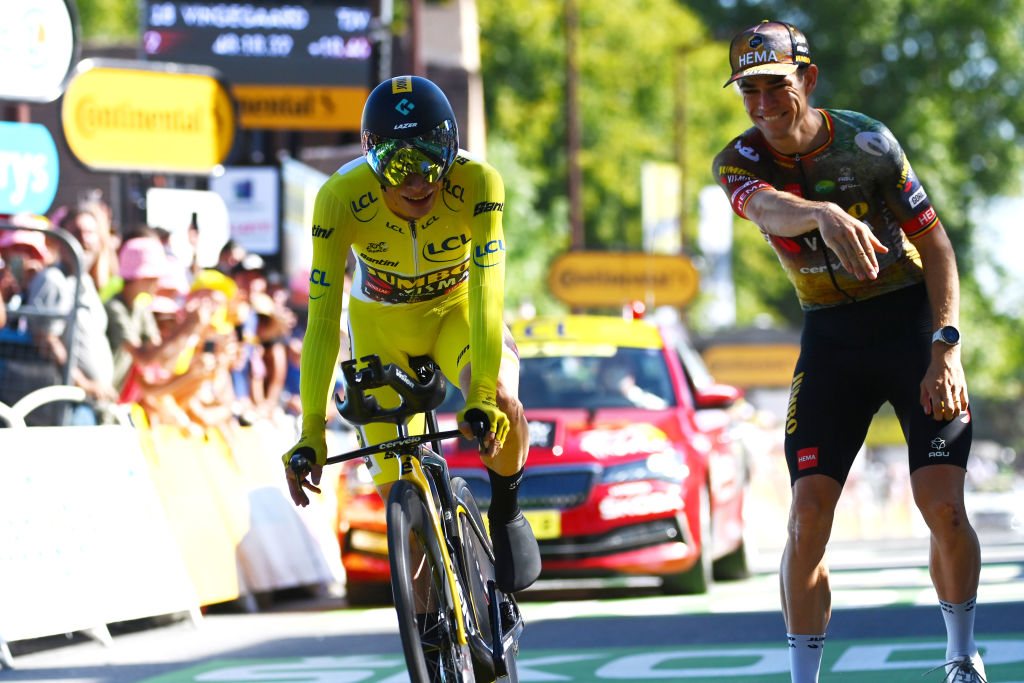Vingegaard: Jumbo-Visma are totally clean, you have to trust us
Van Aert complains that doping question is 'shit' in Tour press conference

Jumbo-Visma’s dominance at this Tour de France was so extreme that Jonas Vingegaard could afford to slow down in the final kilometres of Saturday’s time trial to Rocamadour to concede stage victory to his teammate Wout van Aert. In a Tour with more than a hint of déjà vu, this was something jarringly new.
Van Aert’s victory brought Jumbo-Visma’s tally for this race to six, a figure that might yet increase to seven on the Champs-Élysées. In Paris on Sunday evening, Vingegaard will be feted as the Tour champion, and he will also be crowned king of the mountains. Van Aert will don the green jersey, and he will also be awarded the red dossard as the race’s most combative rider.
Given the history of this sport, of this race and, indeed, of a team that emerged from the ashes of the notorious Rabobank project, it is only logical to gaze upon this supremacy and ask the blindingly-obvious question: can we believe in what we’re seeing?
Vingegaard grew up during an era when Danish cycling was asking itself difficult questions about the doping of its golden generation of the 1990s. He could probably have guessed that such a query would feature at some point during his Tour winner’s press conference on Saturday evening, and his response was delivered with his usual calm.
“We are totally clean, every one of us, and I can say that to every one of you,” Vingegaard said. “Not one of us is taking anything illegal. I think why we are so good is because of the preparation we do. We take altitude camps to the next level, and everything: materials, food and training. I think the team is really the best in this. That’s why you have to trust us.”
A few minutes later, Vingegaard’s stablemate Van Aert sat in the same chair and had a rather less-equable response to a similar question. His penchant for super-combativity, it seems, is not restricted to when he’s aboard his bike.
“I don't want to answer this question. It's such a shit question. It comes back every time someone wins the Tour,” Van Aert complained.
Get The Leadout Newsletter
The latest race content, interviews, features, reviews and expert buying guides, direct to your inbox!
For the second Tour running, Van Aert has won three stage in three different ways. He also wore the yellow jersey for four days and repeatedly shattered the peloton with early attacks. The zenith of his all-action Tour came on stage 18, when Van Aert attacked from kilometre zero to form the early break and then delivered the decisive turn to drop Tadej Pogačar (UAE Team Emirates) on the final climb to Hautacam.
“So now because we're performing at this level, we have to defend ourselves? I don't get it,” Van Aert said. “We worked super hard for this, and cycling has changed. I don't like it that we have to keep replying to these things. We have to pass controls every moment of the year, not just at the Tour de France, they’re coming to our house. It's not that we've come out of nowhere.”
Vingegaard, second a year ago, may not have come out of nowhere this July, but the scale of his progression since turning professional with Jumbo-Visma in 2019 has been striking. In that debut season, for instance, he placed 22nd out of 57 starters in the Danish time trial championships, losing almost three minutes to Kasper Asgreen in 39.8km.
On Saturday, in a time trial of similar distance, Vingegaard averaged 50.559 kph to place second behind Van Aert, but ahead of men like Pogačar, Geraint Thomas and the world time trial champion Filippo Ganna.
“It’s aerodynamics,” Vingegaard said when asked to compare the two performances. “Of course, I would say I’m a better rider now, I push more watts, but I’m also a lot more aerodynamic than I was then. We made a lot of tests in the wind tunnel and on the track and so on. We really worked on this, and it paid off.”
As Vingegaard sat down in the press room in Gramat on Saturday evening, one of the journalists before him was Michael Rasmussen, the last Dane to wear yellow at the Tour for the Dutch team. When Rasmussen first returned to the Tour in his current role in 2015, he was asked about his controversial tenure in yellow, when he repeatedly denied doping before eventually being withdrawn from the race when it emerged he had lied about his whereabouts to avoid doping controls.
“I’ve never heard any rider so far say ‘yes’ to the rolling camera while he’s racing in his active career, so it’s not really the answer that’s wrong but the question,” Rasmussen said then. “It’s a useless question.”
Perhaps, but it’s a question worth asking all the same.

Barry Ryan was Head of Features at Cyclingnews. He has covered professional cycling since 2010, reporting from the Tour de France, Giro d’Italia and events from Argentina to Japan. His writing has appeared in The Independent, Procycling and Cycling Plus. He is the author of The Ascent: Sean Kelly, Stephen Roche and the Rise of Irish Cycling’s Golden Generation, published by Gill Books.